
Lee E. Jankowski personally came to know the suffering in Central America from my experience in the Peace Corps around 1982 while working in the rural areas of Honduras
Reflections of an SOA Protester
by Lee E. Jankowski
I was part of a community of people who went to the Rally to Close the School of the Americas in Washington, DC on Saturday, May 1. We went in order to learn from our brothers and sisters who are all too familiar with the School of the Americas. We were eight people from the Lutheran Volunteers Corps in Wilmington. Several of us had never been to a demonstration before or heard the stories of torture and loss that were presented at this event.
I personally came to know the suffering in Central America from my experience in the Peace Corps around 1982 while working in the rural areas of Honduras. It was during this time that I came into contact with my own bias towards people in the category of "Non-American."
While building a gravity flow water system with the people of an area near the El Salvador border, I unexpectedly found myself abandoned one the work site. The local people who had helped for two weeks were nowhere to be found. When this pattern held for several days, my counterparts with SAANA (Water and Sewer Department of Honduras) and I contacted Peace Corps headquarters. Their solution was for the local military to come in to convince the people to finish the project. Only later, would I find out that the local women, who were only allowed to leave their homes once a day to go for water, were behind this plot to undermine the U.S. government, the Honduran government, and anyone else who was for a clean and healthy water system that would deliver water to their homes or to spigots close to their homes. The time when they went to the river each day was their social time -- their free time, as well as their time to bring water home for daily use. I had helped to take their special time away. Su Casa is me casa. Su Pias is me pias.
So, I learned that the U.S.A. gives with a desire for all it can get in return. Just good business, right? For more on the movement to close the SOA, refer: "An Interview with Fr. Roy Bourgeois," in the May-June, 1999 issue of Loaves & FishesTo do this, we have perfected the art of turning sister and brother against sister and brother in government-sponsored programs. One such program is the School of the Americas.
On May 1, we volunteers came to listen. We came to better understand and we came together to bring brother and sister closer to sister and brother for the betterment of all. Our community of eight became a community of 3,000 in Washington and a community of billions in a world where, as U.S. citizens -- buffered from the abject poverty of so many in the developing world -- we must learn to deny ourselves "wants" if they hurt another. Our communities, no matter how large or small, will not survive without the help of those we have hurt.
In Washington at the rally, South and Central Americans were present in large numbers, offering us the only wealth we have not already taken from them -- their forgiveness, their truth, their compassion, their love, and their hope. The very things we have failed to find in our own land of plenty. In return, all they want is their land and the peace they hope will come with it.
During the demonstrations at Ft. Benning in November, over 2,000 of us crossed onto the base without arrest. Now in Washington, it feels as if we may be about to close the SOA in the U.S.A. I say in the U.S.A. because there is already talk of new names and new facilities in Central and South America where democracies play by different rules, even our own.
Our community of eight won't be able to drive to say Honduras or Chile for a weekend of singing and sign carrying. I know convenience has often kept me at home with excuses instead of being in Washington as a community of eight or of 3,000. Without that participation, we don't see the larger community of billions that we all represent. In that huge community, we are more than volunteers, whether we like it or not, whether it is convenient or not. We are members for life.
This Article was reprinted with permission from Peacework, the Newspaper of Pacem in Terris, Wilmington, Delaware.
